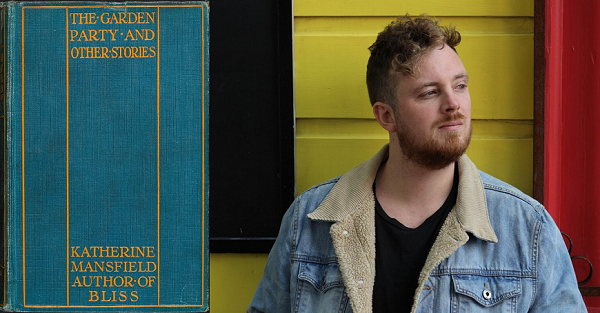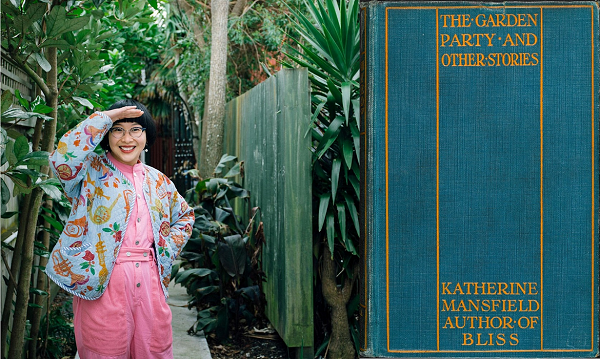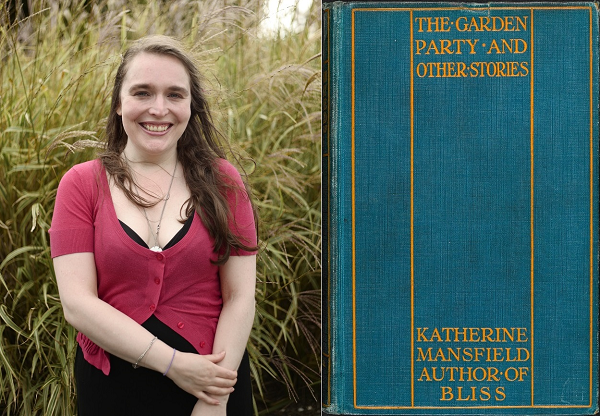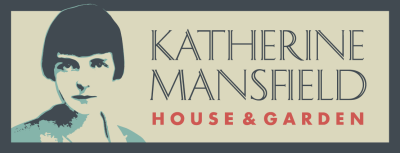AND OTHER STORIES
- 2 October 2022
- Cherie Jacobson
Katherine Mansfield’s third collection of short stories, The Garden Party and Other Stories was published in 1922. The collection includes some of Mansfield’s best-known and most-loved stories, such as ‘At the Bay’, ‘The Garden Party’ and ‘Miss Brill’. But what about the other twelve?
To mark the centenary of The Garden Party and Other Stories, we held a winter series of readings with Wellington writers at Katherine Mansfield House & Garden. We asked each writer to choose one of the lesser-known stories from the collection to read out loud and chat about on a Sunday afternoon. Below are the notes from each discussion.
'Marriage à la Mode' with Jordan Hamel, Sunday 10 July
Jordan Hamel is a Pōneke-based writer, poet and performer. His debut poetry collection Everyone is everyone except you was published by Dead Bird Books in 2022. He was the 2018 New Zealand Poetry Slam champion, the 2021 Michael King Writer in Residence, and has had poetry, essays and stories published in The Spinoff, The Pantograph Punch, Newsroom, Sport, NZ Poetry Shelf, Landfall, Turbine | Kapohau and elsewhere. Jordan joined us just before he headed to the US as a Fulbright Scholar to complete a Masters of Fine Arts in Creative Writing at the University of Michigan! Check out Jordan's website here.

Jordan chose 'Marriage à la Mode', which you can read here. Some of the things we talked about include:
- How fun Isabel’s new friends seem! Although, we could see how insufferable they might be after a while or if you’re not ‘in’ with them. Mansfield manages to skewer them without being mean – we could still feel a warmth towards them with their dramatic flourishes and sense of fun.
- As a poet and a trained lawyer, Jordan could relate to both Isabel's new friends and William stuck on the train with his papers…
- Lady Ottoline Morrell, renowned wealthy hostess of writers, artists and thinkers at Garsington Manor was discussed. Is Isabel a similar figure – she doesn’t seem to be an artist herself but enjoys being around artists and hosting them (and they presumably enjoy staying at her nice house in the country and eating her food). In real life, some of the people hosted by Lady Ottoline were very unflattering in their portrayals of her in their published and private writing. Is Isabel being used and talked about behind her back in the same way?
- Where our sympathies lie as the story develops and then at the end – while many of us absolutely supported Isabel pursuing her own friends and life, we also felt for William who seems to genuinely love Isabel but feels completely on the outer with her new friends.
- We wondered what the future might hold for Isabel and William. Would she ever leave him? Not having an independent source of income (that we know of), would make it very difficult for her to do so.
- The framing device of William buying treats for the children. It’s interesting that Isabel and her friends end up taking the treats, casting them as the childish ones. It was noted that we never actually encounter the children in the story, we only hear about them. One reader wondered what happens to the children?
- The mentions of food and drink in the story: sweets, melon, pineapple, butter running down the cliffs, nougat, sloe gin, bread – and lots of fish! Sardines, salmon, fish mayonnaise.
- The significance of Isabel being called ‘Titania’ by her new friends. Titania is the Queen of the Fairies in A Midsummer Night's Dream. Under an enchantment, she falls in love with the first thing she sees – an ass. Are her new friends the asses? Or William as her husband?
- We talked about how a reader’s feelings or response to the end of the story might change over time. One reader pointed out how telling the final line is, “And, laughing, in the new way, she ran down the stairs.”
Jordan then read one of his own poems, the perfectly chosen 'We are the happiest couple at the party.'
'The Lady's Maid' with Rose Lu, Sunday 7 August
Rose Lu joined us while living at nearby Randell Cottage as the 2022 Randell Cottage Writer in Residence. Rose holds a Masters of Creative Writing from Te Herenga Waka Victoria University of Wellington’s International Institute of Modern Letters. Her first book was the 2019 essay collection All Who Live On Islands, winner of the IIML’s 2018 creative non-fiction writing prize. The essays in All Who Live on Islands draw on Rose's experiences as the child of Chinese immigrants in small-town New Zealand and you can hear her read abridged versions on RNZ National here.

Rose chose 'The Lady's Maid', which you can read here. Some of the things we discussed in relation to 'The Lady's Maid' include:
- The story is a monologue, its very first line is like a stage direction and, as Rose noted, it does so much work for so few words - establishing time and place for the reader. The beginning of ‘At the Bay’ also begins with a line like the opening of a script for a film or play, ‘Very early morning.’
- This story is an example of Mansfield as a Modernist writer in the way it deviates from a more traditional story structure and doesn’t have a plot. Instead, we are dropped into a moment and the life and thoughts of a character.
- Rose said the first thing this story reminded her of when she read it was a 2016 Korean film, The Handmaiden, directed by Park Chan-wook, in which a lady’s maid falls in love with her female employer (although Rose noted the plot is much more complicated and darker than that simple summary!). Rose wondered about a queer reading of ‘The Lady’s Maid’. We discussed other Mansfield stories that stand up to queer readings, such as ‘Bliss’ and 'Leves Amores', as well as Mansfield’s own passionate journal entries about experiences with women.
- An attendee mentioned another film the story reminded her of, The Remains of the Day. This is an adaptation by director James Ivory of a Kazuo Ishiguro novel about a devoted servant who denies an opportunity at love to continue serving his master.
- We discussed the dynamics of servant/employer relationships and how in the era ‘The Lady’s Maid’ was set, there would definitely have been servants who felt great loyalty to their employer, without romantic love being involved. Especially someone like Ellen, the protagonist of ‘The Lady’s Maid’, who has worked for the same family since she was 13.
- Mansfield described the story as a 'Christmas story' in a letter to her husband John Middleton Murry, who published it in 24 December 1920 edition of the literary magazine he edited. We discussed why Mansfield might have considered it a Christmas story. The only overt reference to Christmas is when Ellen mentions her idea for a Christmas display in a florist shop window. There are also mentions of donkeys, an animal associated with Christmas through the nativity story.
- We considered whether Christmas is a happy or sad time for many people. Christmas is often associated with spending time with family, so it can be lonely if you don’t have any family you are close to. The character Ellen has no family she is close to, she was raised by her grandfather, then her aunt. She became a maid young and has been with the same family ever since. She feels very attached to her employer, perhaps like her employer is her family. At the end of the story, we are left feeling sad after hearing how she broke off an engagement in favour of staying with her ‘lady’ and how she doesn’t like to think about what will become of her when her employer passes away. Perhaps this is why Mansfield felt it was a Christmas story – a sense of loneliness, a time of reflection, the family you make/choose versus the family you’re born into.
- The experiences of domestic staff are explored often in Mansfield’s work. In The Garden Party and Other Stories alone there is ‘The Life of Ma Parker’, which focuses on Ma Parker, a ‘charwoman’ (cleaner) and Alice, the ‘servant girl’, has her own section of ‘At the Bay’. Those in the audience familiar with these stories felt Mansfield was able to write empathetically about these characters, possibly because she felt like an outsider herself at different times of her life.
Rose then read from her essay 'Rich Person Shop / Poor Person Shop', which you can listen to her read here.
'Mr and Mrs Dove' with Helen Vivienne Fletcher, Sunday 11 September
Helen Vivienne Fletcher is a widely published children’s and young adult author, storyteller and award-winning playwright. She has written an impressive collection of work for everyone from pre-schoolers to adult readers. Spanning a variety of subjects, Helen’s writing doesn’t shy away from the gritty parts of life. Diving into the depths of disability, the gravitas of grief or the thrill of the mysterious, her stories are sublimely suspenseful whether on the page or stage. Connecting the real world with flights of fantasy, she creates fast-paced fiction to delight and draw in readers and audiences across Aotearoa. Helen lives in Wellington with her disability assistance dog, Bindi, a seven-year-old playful Labrador who loves soft toys, cuddles, and can fit three tennis balls in her mouth at once. Visit Helen's website here.

Helen chose 'Mr and Mrs Dove', which you can read here. Some of the things mentioned during the discussion of ‘Mr and Mrs Dove’ were:
- Helen chose the story because she thought that, aside from some of the markers of the time (e.g. the references to Rhodesia, which doesn’t exist anymore), it still felt quite modern as a story of unrequited love and the complex feelings that go with that for both people.
- She could also vividly imagine the story as she read it – we noted that this is an impressive skill of Mansfield’s, she doesn’t labour the details but gives the reader just enough to help them build a picture in their mind of the characters, the setting, the action.
- We questioned whether it really is unrequited love, or whether Anne has an unrealistic idea of love – she tells Reggie she feels she can say anything to him, that she’s never liked anyone as much as she likes him or felt as happy with anyone, “But I’m sure it’s not what people and what books mean when they talk about love." Reggie thinks of the lead actors they have seen in plays together “a tall, handsome, brilliant stranger…without a word catching the heroine in his arms, and after one long, tremendous look, carrying her off to anywhere.”
- Perhaps Anne just isn’t attracted to Reggie, she can’t see him as anything more than a friend which is why she is legitimately turning him down.
- The story explores how people see themselves versus how others see them. Reggie thinks Anne constantly laughs at him and doesn’t want to marry him because she sees herself as above him, but she says “You’re much better than I am. You’re marvellously unselfish and... and kind and simple. I’m none of those things. You don’t know me. I’m the most awful character.”
- The way Reggie sees himself compared with Anne means he lacks confidence and wants to do anything to please her and to serve her. Anne likely sees this and knows they would not be equal partners in a relationship – she would be the one with all the power. We discussed whether Anne was a ‘modern’ woman of the 1920s and this is why she was saying no to Reggie, she wanted to choose her partner, a partner she really loved and felt attracted to rather than a convenient marriage. Marrying him would mean following him back to Rhodesia and as a modern woman, she didn’t want to have to give up her life and follow a man around. Or, whether she was actually tied to traditional gender norms and wanted a powerful man who took charge and wasn’t so timid and willing to run around after her.
- We discussed something Mansfield had written in a letter about this story, “I have a sneaking notion that I have, at the end, used the doves unwarrantably. Tu sais ce que je veux dire. I used them to round off something, didn’t I?” Helen felt that the dove metaphor shouldn’t work, it’s a bit heavy-handed, but it does actually work and she thinks that’s because it is directly referenced in the story. Anne herself says “But we’d be like... like Mr. and Mrs. Dove.”
Helen then read an excerpt from one of her own short stories, set in a dystopian future where the atmosphere has caused all the printed books to crumble and the libraries rely on ‘living books’ to hold and share knowledge. This story will appear in an upcoming anthology called The Art of Being Human.
